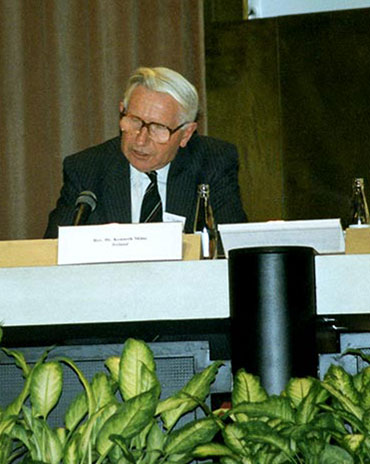 Dr. Kenneth Milne, Ireland
Dr. Kenneth Milne, Ireland
Dr. Kenneth Milne
Ireland. The General Synode, working group on Europe
Ladies and Gentlemen, The event in which we are participating seeks to promote mutual understanding. This will contribute to peace, tolerance and respect of the differences. Coming as I do from Ireland I greatly value the opportunity to take part in the discussion of issues that face us daily where I live. I am going to say something about a country you may not know much about yourselves, a small country, where in very recent years terrible acts of violence have occurred and a great deal of fear exists. And yet both parts of it, as it is divided into two jurisdictions, north and south, both of them are members of the European Union. On the small island of Ireland the search for understanding is part of our everyday experience. And while it are the problems of Northern Ireland - that part of the island that lies within the United Kingdom - that are most widely known because of the violence that so often has issued from them, it is important to remember that the problems of Northern Ireland were created by Irish history which is shared by all the people who live in Ireland, north and south.
Those of us who live as I do in the Republic of Ireland cannot wash our hands of events in the North only because fundamental to community disagreement in the North is the determination of the unionist population they’re not in any way to be a part of the Republic where I live, a republic which has traditionally made constitutional claims on the North. That unionist population, approaching one million in number, is largely protestant in religion. The nationalistic people of the North, a substantial minority of about forty per cent, is largely roman catholic. And finally something of an oversimplification to equate unionist with protestant and nationalistic with catholic, to do so is not seriously misleading. Because unionists in the North feel an affinity with Great Britain and the nationalists an affinity with the Republic of Ireland there are complex relationships between the two islands of Britain and Ireland, both of us members of the European Union and both of us parliamentary democracies which are in very happy diplomatic relationships with each other.
The partitioning of Ireland in 1920 was seen by the British government of the day as the best of a difficult series of choices. Most Irish people wanted a high degree of independence from Britain, but there was a large protestant population concentrated in the North-East who, because of the predominantly catholic character of the South, refused to accept home rule regarding it as Rome rule. Hence the two political entities, Northern Ireland and what was then called the Irish Free State, now the Republic of Ireland. Since partition the dissatisfaction of Northern nationalists with their lot has scarcely subsided. (Though many of them most keenly felt grievances had been addressed what has changed dramatically?) has been the explicit statement by Britain that she has no vested interest in retaining Northern Ireland in the United Kingdom and would facilitate a constitutional change that was voted for by the people of the North. Equally important has been the recognition by the Republic that any constitutional change in the North must have the consent of the unionist population there. So you might say what is the problem? The problem can be presented in several ways, one of which is that the unionist people of Northern Ireland are deeply apprehensive that any attempt to meet the wishes of the nationalists will diminish their link with Britain. Nationalists for their part reject any form of majority rule in Northern Ireland that would put them in a position of disadvantage vis a vis the majority population.
These attitudes are grounded where the unionists are concerned in the fact seldom denied now in the Republic that society there was for many years regulated to a considerable degree by Roman catholic social teaching. Nationalists in Northern Ireland for their part remember long years of government by a local parliament with a permanent unionist-protestant government under which discrimination seriously occurred. That again is seldom denied today. When we bear in mind that the traditional links between unionists and protestant and nationalist and catholic are very much to the floor in all political debate the complexity of the situation is apparent.
There are many people of little or no religious commitment on both sides who nonetheless empathize culturally and politically with the community into which they were born. The churches in Ireland are not divided by the political border. Furthermore especially of late relations between them are cordial. Churches are deeply aware that they must work together for the good of Irish society as a whole. But attitudes among church members are influenced by the legacy of conflicts over the centuries, not just since the nineteen twenties. Indeed the churches in Ireland acknowlege that until recently they have been slow to address the concerns of the other community and too slow to examine their own record in the search for reasons as to why one community perceives the other as a threat.
Before a settlement in Northern Ireland can be achieved there must be reconciliation, and that must be top of any church's agenda. But the word is often used in too facile a manner. Reconciliation will not come about by telling people to be reconciled. Sores and wounds run too deeply for that. Rather the roots of disagreement and of sectarianism have to be identified and tackled. These are deeply embedded in the folk memory of both traditions, often it must be said nurtured by tendencious history taking and irresponsible political pastoring. But until we can achieve some kind of reconciliation of folk memory, even conceivably some sharing of folk memory we can hardly hope for that capacity to develop empathy with others that is an essential for reconciliation.
It hasn't escaped the attention of many of us that we live in a small country with a small population well endowed with natural resources and happily spared the natural disasters that have hit so many other places. In other words we have a lot going for us and we realize that it is a scandal that with the level of religious commitment and observance that is extraordinarily high by European standards religion is perceived and justifiably so to be inextricably mixed with political sentiments that are frequently expressed with intolerance and even hatred. For this reason two of the questions on our agenda today strike me as being of a special relevance to us in Ireland and I have been interested and greatly helped by many of the things I heard earlier at the occasion. How can the great religious traditions help free people from the things that imprison them as so many of us in Ireland are imprisoned? And how do those who seek to accomplish this difference differ from politicians in their approach? If out of today will come some guidance as to how these matters are to be tackled it will certainly not have been in vain. Thank you very much.
 |
« Events to promote Peace », Brussels, the 13-14.09.1997 Organization : Non Profit Association Ouvertures a.s.b.l., Annelie Löhr-Campion, Belgium ouverturesforpeace.eu |




